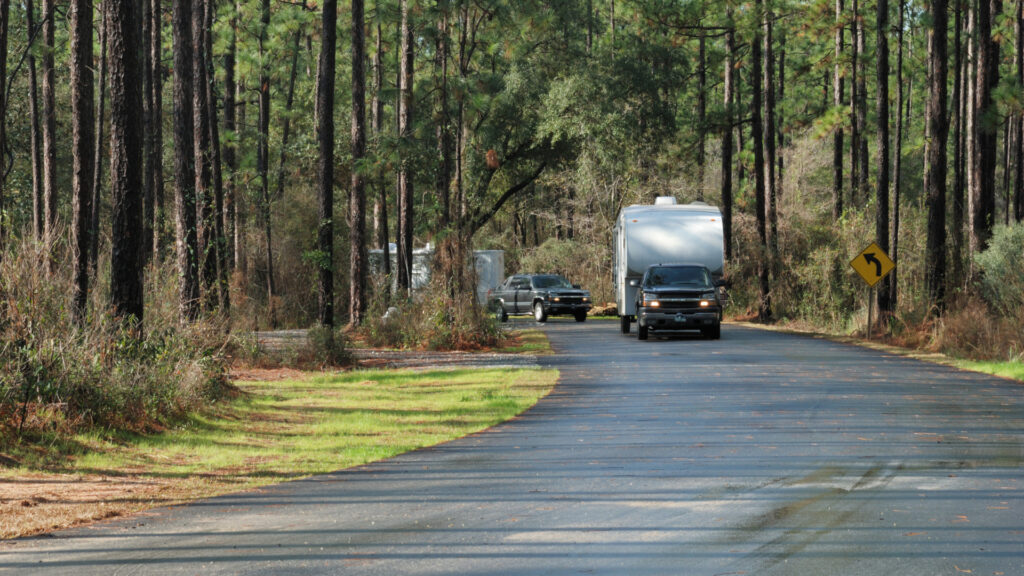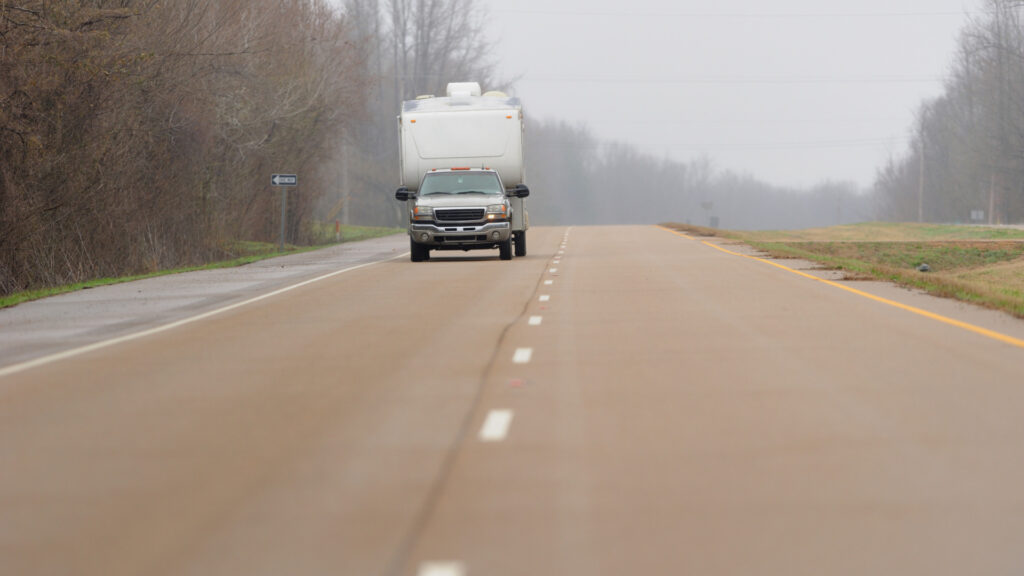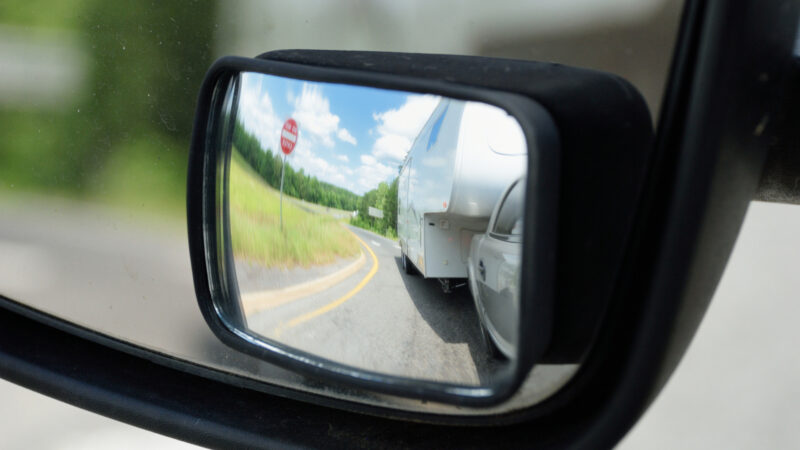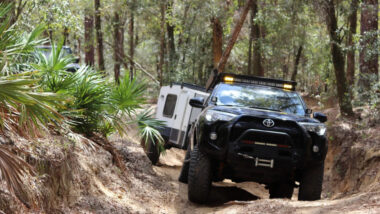Table of Contents Show
You may dream of getting your name into the Guinness World Record books. However, there are some rather strange and intense world records in the books, and some are more attainable than others. However, could you beat the world record for the fastest trailer tow?
If we’re being honest, your chances are very good, but we wouldn’t encourage you to attempt it. So what is the fastest trailer tow record? Let’s see!
What Is the World Record for Fastest Trailer Tow?
On Aug. 23, 2012, a brave group of individuals from Diesel Power Magazine set out to snap the precious record of 139.11 miles per hour.
They became the new record holders when their vehicle and trailer rocketed across the finish line at 141.998 miles per hour. The group more than doubled the suggested speed for most campers when towing across the California desert.
Lucky for them, they retain their title over a decade after crossing the finish line.
Who Broke the Record?
Those responsible for breaking the record were Jason Sands, the editor of Diesel Power Magazine, and a crew of mechanics to support him. Jason was the brave driver behind the wheel.
He also initiated the nitrous as the truck soared a couple of miles across the California flats. While he may have been the driver, it wouldn’t have been possible without the support crew.
What Equipment Did They Use to Set the Record?
Jason Sands drove a heavily modified GMC 2500HD towing a standard Carson Kalispell camper to set the record. The only modification to the camper was that they upgraded the wheels to handle the extreme speed.
And, don’t worry; they did the feat in a desert and in a controlled environment to reduce some of the risks.
Though you should not attempt it with your trailer, it was an impressive run nonetheless. Sands and his crew deserve the award and recognition for such an impressive feat.
How Fast Should You Drive When Towing a Trailer?
You must watch your speed when towing a trailer; not only does it increase safety, but it also helps you conserve fuel.
Most RVers follow the speed limits but typically never exceed 65 miles per hour. Some states, like California, have a maximum speed limit of 55 miles per hour for any vehicle towing a trailer.
It’s important to know that trailer tires typically have a much lower speed rating than standard passenger tires. Exceeding the speed rating for your tires can cause increased wear and tear and lead to a blowout.
Tips for Safely Towing a Trailer
Obviously, you shouldn’t tow a trailer over 140 miles per hour. However, you can do several other things to stay safe while towing a trailer. Here are some safety tips you should practice while towing a trailer.
Don’t Skip a Pre-Trip Inspection
Before you hit the road, always do a pre-trip inspection. Walk around your rig and inspect everything to ensure you’re ready to go. Look high and low for any signs of potential issues.
Don’t forget important things like checking your tire pressure, torquing your lug nuts, and ensuring you’ve hitched your rig correctly. We even made an RV Departure Checklist to help you avoid forgetting any important steps.
Pro Tip: If you’re new to towing an RV, don’t attempt to until you read our RV Towing Guide for Newbies
Plan Your Route
Unfortunately, not every road is RV-friendly. This means you can’t trust Google Maps or Apple Maps to get you and your rig from point A to point B.
These maps don’t consider low clearances, weight restrictions, or other important factors when towing a trailer.
We recommend using a resource like RV LIFE Trip Wizard or an RV-specific GPS when planning your route. You can input your rig’s specific dimensions, which helps ensure you and your RV don’t find yourself in a sticky situation.

Distribute the Weight Evenly
One mistake many RVers make with their RVs is how they load their rig. Putting too much weight toward the rear of your trailer can cause instability and lead to trailer sway.
In addition, putting too much weight on the left or right side of your trailer can overload the weight rating on a tire and lead to a blowout.
It can be challenging, but you want to distribute the weight of your gear and contents as evenly as possible. Haul your RV across a weight scale to ensure you obey the weight rating for your rig and its axles.
Know and Follow Tow Vehicle Capabilities
One of our least favorite things to see in a campground or on the road is an RV owner exceeding the capabilities of their tow vehicle. It puts them and other drivers at severe risk.
It’s essential that you know and follow your tow vehicle’s capabilities. Two of the most important ones are your truck’s tow rating and payload capacity.
Typically, the payload capacity will be the weakest link in the chain for towing capabilities. The payload capacity is the total weight you can add to your vehicle. This includes the weight of fuel, passengers, and from the trailer.
Exceeding the payload capacity will lead to increased wear and tear on your vehicle and cause a potential safety issue.
Check the Weather
Driving in severe weather isn’t fun, especially when hauling a trailer or in a large motorhome. Strong wind gusts can easily blow you from one side of the road to the other. Check the weather and plan your travels accordingly.
In some situations, it may mean adjusting your travel plans. You may need to leave early or stay late, if possible. If severe weather is in the forecast, you don’t want to get caught by surprise. It’s a good idea to check the weather throughout your trip.

Take a Break When Needed
Towing can be exhausting for everyone in the vehicle, especially the driver. You need to watch and consider many things while driving.
We recommend taking a break every two or three hours. Top off your fuel tank, use the restroom, and stretch your legs. Then you can hit the road fresh and safely reach your final destination.
Keep in Mind: Make sure to take a break while on the road when you need to! Here are the Easiest Way to Find the Next Rest Stop on Your Route
Watch Your Speed
As we stated, speeding is never acceptable while RVing. You can put yourself and others in danger by doing so.
While we would love to arrive at campsites as soon as possible, we never exceed 65 miles per hour when towing. It’s simply not worth it. Always take your time and keep an eye on your speedometer.
Should You Try to Beat the World Record for Fastest Trailer Tow?
Unfortunately, if your eyes are set on a world record, we suggest you consider something other than the fastest trailer tow.
Hauling a trailer can be scary under normal circumstances, but over 140 miles per hour is insanity.
A tire blowout or other mechanical failure at those kinds of speeds could turn deadly really quickly. It’s simply not worth the risks.
The ones who beat the world record for the fastest trailer tow were professionals and took extreme caution.






